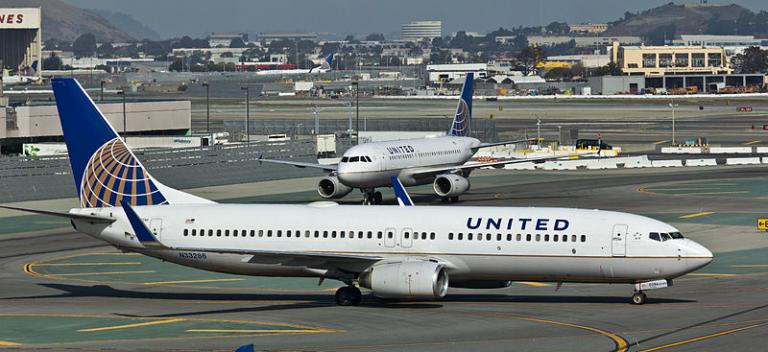
A United flight is overbooked. For some unidentified reason, the crew has allowed all the passengers, plus four extras, to board, rather than resolving the situation at the gate, but once they’ve realized that they need to straighten this out, they follow their usual procedures: offering their usual vouchers (in this case, $800) plus paid hotel for anyone willing to exit the plane.
When only two people the vouchers, they, again, following the usual procedure, randomly determine two additional passengers who are they required to relinquish their seats. One of these does not and is dragged off the plane, with, reportedly, enough violence (or just bad luck) that he is seemingly knocked unconscious. (It’s not clear that this was definitively the case.)
(See, e.g., the Huffington Post.)
What went wrong?
One wrinkle is that the “four extra” were not “regular” passengers, but crew members who needed to be moved to their new location to report to work there. Tweeters and commenters are complaining that they should have just rented a car and driven to their destination, a 5 hour drive with normal driving conditions. Could United really have required this of their employees? I wouldn’t be surprised if somewhere along the way union contracts or FAA regulations prohibited it.
Obviously, United shouldn’t have let the situation get to this point. It’s generally understood that airlines overbook flights because they want to maximize revenue, and a certain portion of passengers will fail to show. And the overbooking is one of the ways in which flights are as comparatively inexpensive as they are. (Do I know how much flights cost before deregulation? No. But I know that the first time I flew in an airplane was for a high school trip to Washington that I had saved up for myself with my afterschool job.)
So let’s imagine that they hadn’t — that they had chosen this man, randomly along with the three others, at the gate. He’d still be out of luck, stuck there ’til the next day unless he could find some other way to travel to his destination (a quick search suggests that Greyhound buses and Amtrak trains would have been options).
Was it inherently wrong that he and the others were bumped, in the first place? I’m reading responses everywhere that the entire system is wrong, that airlines should be forced to offer however much compensation is necessary in order to get individuals to voluntarily accept the compensation, whether that’s $100 or $1,000 or $10,000.
Is that fairer? Everyone’s making the argument that this means that those who most urgently need to get home, will get there, and that those who are most flexible, will accept the compensation. But how much would airlines have to offer? I have the impression that expectations have increased from what they once were, that people think of vouchers-for-getting-bumped as a chance to win the lottery, but at the same time, there are legal caps on how much the airlines offer volunteers. And the purchase of a ticket entails terms and conditions in which the passenger agrees to the risks of being bumped.
Perhaps, in the long run, those caps should be increased. We can surmise that the airline industry negotiated those caps — but perhaps it was thought to be fairer to make the bumping process random, so that rich and poor had an equal chance of getting home on time. And people keep repeating that he was a doctor who had patients to see the next day – but doctors reschedule their patients plenty often and their schedules are not sacred.
But in the situation as it was, what should have happened? Imagine if he has refused, and United had said, fine, if you won’t get out of your seat, we’ll just pick someone else. Wouldn’t it have been a recipe for disaster, if refusal to cooperate wins the day?
So that leaves us at whether Security was “nice enough” when they removed him from the plane, and here I’m just not going to weigh in because I suspect that idea of using the minimum amount of force necessary is difficult to truly put into practice.
My bottom line: knowing that the rules of the game are that you risk being bumped every time you fly, just as you risk flight delays or cancellations due to bad weather or mechanical troubles, it is actually the responsibility of the passengers to follow the rules that air a basic part of air travel. So, no, this incident is not going to cause me to take my business elsewhere.
Readers, would you have kicked and screamed if you were randomly chosen to surrender your seat, or complied? And would you have been willing to pay an upcharge to have a guaranteed seat?
UPDATE: Ann Althouse covers this, and adds some details, including a report that, according to another passenger, after his claim of being a doctor didn’t work, he played the Race Card, and claimed that he had been selected because he was Chinese. Readers also chimed in that the pre-dragging standoff lasted a good 10 minutes, he started screaming when the police came to remove him, and he “went limp” like a toddler refusing to cooperate, rather than being unconscious. I was actually surprised at the number of her readers who had no sympathy for the man, who, after all, refused to follow the rules and tried to claim special privileges.
What’s more, it seems to me that the reaction of many of those who come down 100% in support of the passenger have a sort of “win the lottery” attitude. Airlines should offer $5,000, not $800, because who wouldn’t want $5,000 extra in your pocket? And the folks who say, “United made a stupid decision because it’ll now cost them far more” are creating a self-fulfilling prophecy, because they’re putting themselves in the passenger’s shoes and imagining winning a lawsuit. Does the existence of cell phone cameras now mean that the passenger now always must get their way? I have the impression the ability to record, and tweet, has led to magnifying incidents and changing behavior — even when you watch the video there’s a woman screaming, “oh my God” in a way that seems intended for the recording, not her genuine reaction to the incident.
UPDATE 2: Virginia Postrel shared, via facebook, a very informative article on the topic, with an expert explaining why those 4 crew members needed to be on that flight (though not why they waited ’til everyone had already boarded to deal with it).
Image: https://commons.wikimedia.org/wiki/File:United_Airlines_-_N33286_-_Boeing_737-800_-_San_Francisco_International_Airport-0401.jpg; © Raimond Spekking / , via Wikimedia Commons













